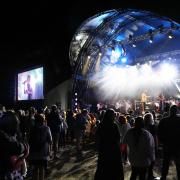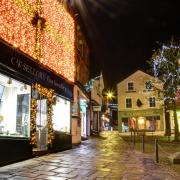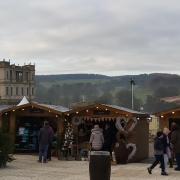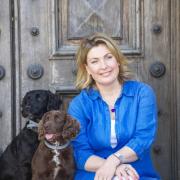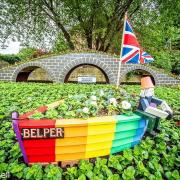A visit to the High Peak Hospice at Chapel-en-le-Frith

I am sitting in the reception area of Blythe House Hospice, Chapel-en-le-Frith, waiting to meet Ann Burgoyne, Macmillan Nurse, to speak about Blythe House’s work. I wasn’t sure what to expect, though I confess I did feel a little uneasy.
I suppose I am lucky and have never been brought into contact with a hospice in my personal life, and my impressions had been shaped by preconceptions, with the word ‘hospice’ at best casting long shadows of well-intentioned succour across the troubling thought of our all too mortal frailty.
A surprise for me then, the brightness and energy of this reception area. In the five minutes I was there a man came in with £90 worth of change from the Conservative Club in Chinley.
After he had gone, the receptionist began to sort the coins. ‘We get all sorts bringing their money in here,’ she told me cheerfully. ‘People will hold collections at parties instead of presents. All sorts.’

Blythe House, I was soon to discover, does not conduct its business in the shadows. It is very much a place of hope.
Blythe House was founded in 1989 with a legacy of £1,000 left by Stan Blythe, a Buxton man. That simple legacy has now grown into a facility which offers free, individualised, holistic care and support for anyone in the High Peak living with cancer or other serious, life threatening illness. The aim is to provide a range of services and support in a positive and tranquil environment.
‘We have what we call a Living Well Service which we provide at Blythe House, which is for adults with a diagnosis of cancer, or any other life threatening illness, and their families and carers,’ says Ann Burgoyne, Macmillan Living Well Services Lead Practitioner.
Blythe House has a range of services delivered by staff and volunteers that are designed to treat both mind and body. They are a Macmillan Information and Support Centre, and they offer pain relief, symptom control, counselling and a range of complementary therapies.

The negative image of a hospice as a place people go to die is one that has to be constantly tackled – not least because unlike some hospices, Blythe House supports people from first diagnosis onwards.
Their aim is that people do not just survive with cancer, but learn how to thrive with the disease, to take control of their lives and not just live, but live their lives well.
A client entering the Living Well Services begins with an assessment (at Blythe House, they refer to people as ‘clients’ rather than ‘patients’).
‘The holistic needs assessment allows the client to set their own agenda and contributes to providing them with an individual support pathway according to their needs,’ says Ann.

These ‘needs’ may be physical, such as pain management, or they may be emotional, or even spiritual, if the client welcomes such an approach.
Talking to Ann, I’m surprised at how central complementary therapies seem to be to the services Blythe House offers.
‘I suppose people may look at complementary therapies and see them as a nice, “touchy feely”, pleasant thing to have,’ says Ann. ‘But we see them as a part of the process of supporting that person’s rehabilitation or adaptation to living with the illness.’
A diagnosis of cancer or a life threatening illness can have devastating emotional consequences, both for the person diagnosed and for those close to them. Statistics tell us that 45 per cent of people with cancer say the emotional effects are the most difficult to cope with, compared to the physical and practical aspects.

These emotional effects may manifest themselves as anxiety, low mood, and difficulties sleeping. ‘This can have a huge impact on people’s lives and create a feeling for them of living on “high alert”, meaning a continually high level of stress or fear which can lead to sometimes feeling panic and being out of control,’ says Ann.
At Blythe House, they use complementary therapies to help clients self-manage these potentially emotionally debilitating states.‘Complementary therapy teaches them how to relax again, as well as using skills they can transfer into everyday life,’ explains Ann.
Ann, whose career has included spells in Accident and Emergency nursing and lung cancer prevention in a public health setting, herself practices indian head massage and hypnotherapy. She is also a Reiki master practitioner, and a mindfulness compassion practitioner and teacher.
Acupuncture and reflexology are also on offer. Complementary therapy can be a good way of helping people to feel that they are taking back control of their bodies – something that a diagnosis of cancer can often take away. ‘For some Living Well Service clients, there can be that sense of having lost trust in your body. And there may be a feeling of who owns your body – when you have been subjected to surgery, chemotherapy, radiotherapy – whose body is it?’ says Ann. ‘And to have that opportunity to have a complementary therapy treatment, where there is almost a sense of having your body given back to you.’
But the Living Well Services are about more than complementary therapies alone. There are art groups, meditation groups, counselling groups – even walking groups in the High Peak countryside. Blythe House Hospice is – as paradoxical as it may seem at first glance – a celebration of life.
Clients can be referred by other health professionals, or they can just call in if they feel it would help. There are currently two million people living with cancer in the UK, and the number increases by 3.2 per cent every year. By 2030, Macmillan estimate that four million people will be living with cancer. However, half of the people diagnosed with cancer now survive their disease for at least ten years. Cancer survival rates in the UK have doubled in the last 40 years. Services such as those offered by Blythe House, which helps people to cope with both the physical and emotional trauma of living with a serious diagnosis, are increasingly in demand.
‘It is not just a question of how do people survive, but how do they thrive?’ says Ann. ‘How do they live well with their condition? It is giving people the hope, that: “yes, you have got this”, and “yes, there are going to be challenges”, but it is how you manage those challenges that is going to make the difference.’
Blythe House is largely funded by donation, and relies on a dedicated team of volunteers. More of both are always needed.
Help a Hospice – #ChallengeDerbyshire
Blythe House is joining fundraising efforts with Ashgate Hospicecare and Helen’s Trust to raise money to help people suffering from serious illness in Derbyshire. Ashgate Hospicecare helps people across North Derbyshire and its nurses make 3,000 home visits every year. Helen’s Trust provides equipment which allows people with terminal illness to remain at home and helps over 150 people across North Derbyshire every year. Together they are asking people to take on a challenge in 2015 to raise money for the three charities. This may be something such as giving up alcohol for a month or embarking on more energetic!
The three charities hope to raise £100,000 in 2015, which will give each charity over £33,000 and could pay for:
Ashgate Hospicecare nurses to visit 439 people in their homes
Blythe House Hospice to give 1,320 Complementary Therapy Sessions
Helen’s Trust to coordinate 10 hours of night care for 222 people
If you would rather have a ready-made challenge and you’re feeling fit, how about getting in training for the Derbyshire 3 Peaks challenge on 26th September? A challenging 13 mile route that scales Kinder Scout, Brown Knoll, and Mam Tor. All accompanied by qualified instructors.
Go to the Challenge Derbyshire Facebook page, or on Twitter, and use the #ChallengeDerbyshire hash tag. Post details of your own challenge, or find out more about 3 Peaks. For more details see www.facebook.com/ChallengeDerbyshire?fref=ts






